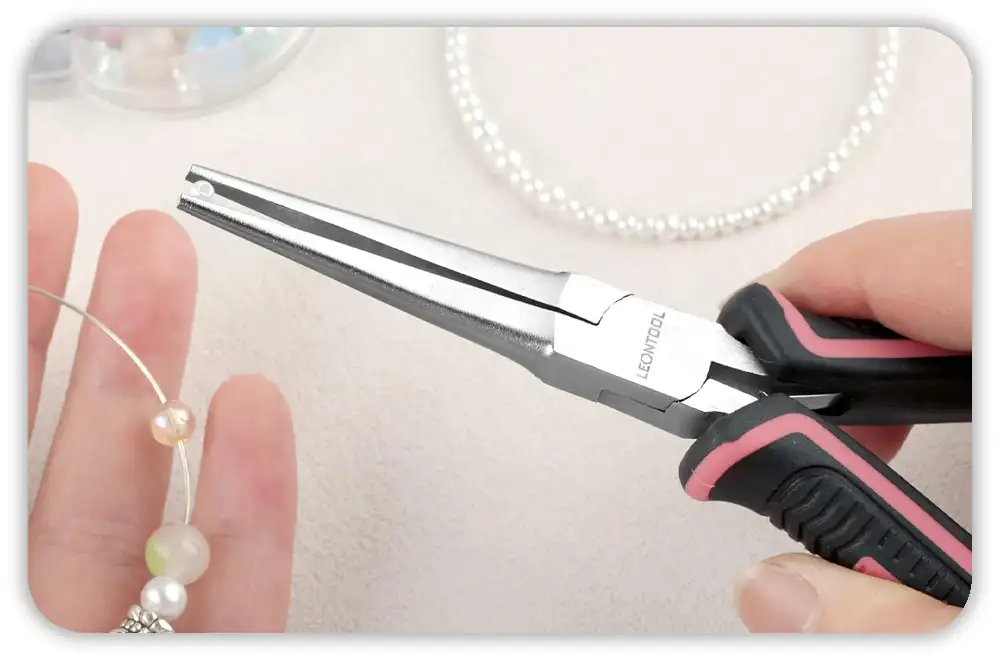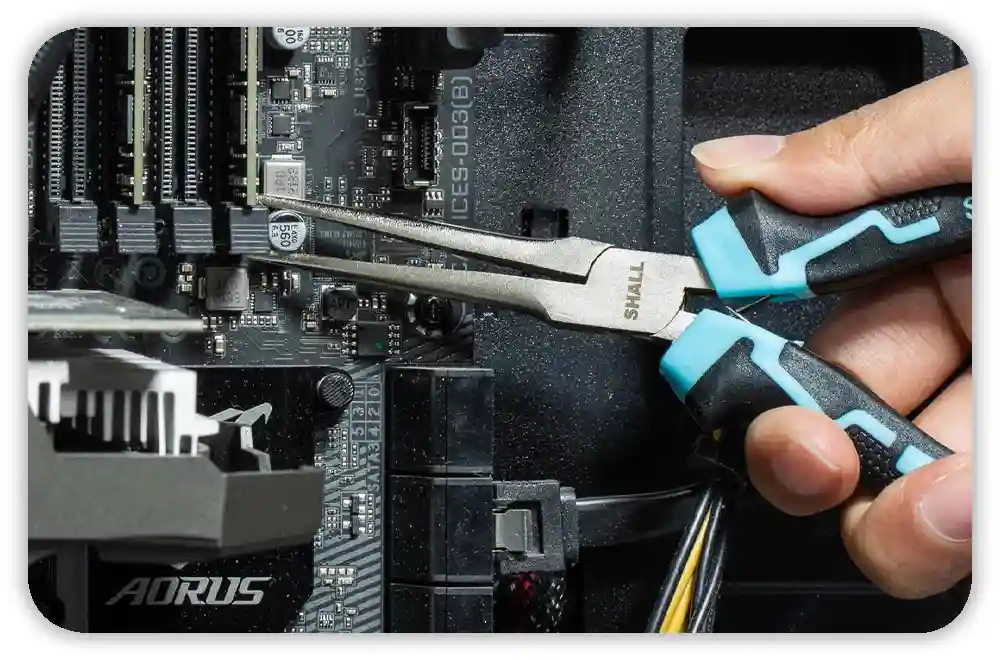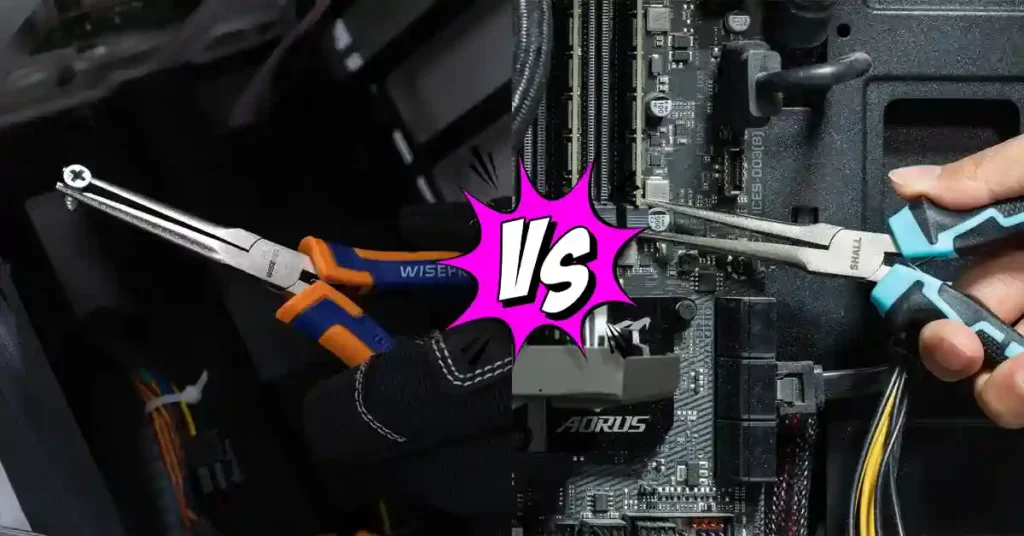For years, I thought chain nose pliers and needle nose pliers were the same. Both have narrow jaws and handle tiny parts well. But after using them for jewelry, wiring, and repairs, I learned they are not alike at all.
They may look similar, but once you use them, the difference is clear. Knowing which one to pick can save time and prevent mistakes.
Table of Contents
What Each Tool Does
Each plier has its own job. Their design shows how they’re meant to be used.
Chain Nose Pliers
Chain nose pliers have short jaws that are flat inside and rounded outside. The flat grip holds parts tight without scratching them.
I use them for bending wire loops, closing jump rings, and shaping small metal parts. They’re perfect when you need control and a smooth finish.
To me, chain nose pliers are all about control and finesse.
Needle Nose Pliers
Needle nose pliers have long, thin jaws that come to a point. The inside is usually serrated, which helps grip things firmly.
I use them when fixing wires, fishing gear, or machines. They can reach into narrow spots where fingers can’t.
They’re made for reach and strength, not for polish.
Key Differences

Here’s what stands out when using both:
- Precision: Chain nose pliers give smooth, careful bends. Needle nose pliers grab things in tight spaces.
- Jaw Shape: Chain nose jaws are smooth and rounded. Needle nose jaws are sharp and ridged.
- Reach: Needle nose pliers reach farther. Chain nose pliers keep your hand close.
- Grip: Needle nose pliers hold tight. Chain nose pliers grip gently.
- Comfort: Chain nose pliers feel easier for long work. Needle nose pliers need more hand power.
- Durability: Both last well, but the longer jaws of needle nose pliers can flex under pressure.
- Safety: Smooth jaws don’t scratch but can slip. Serrated jaws grip better but can mark surfaces.
Comparison Table: Chain Nose Pliers vs Needle Nose
| Feature | Chain Nose Pliers | Needle Nose Pliers |
| Jaw Design | Flat inside, rounded outside | Long, narrow, serrated |
| Precision | High for small work | Great for deep or tight spots |
| Grip | Gentle and smooth | Strong and firm |
| Reach | Short | Long |
| Comfort | Easy on hands | Needs more force |
| Best Use | Jewelry, crafts, small parts | Electrical, repair, hard-to-reach spots |
| Safety | Low scratch risk | Better grip, more pressure |
When to Use Each

I pick chain nose pliers for bending fine wire or small jewelry fixes. They let me work clean and close.
I grab needle nose pliers when I need to reach into tight spots or pull something stuck.
In most toolboxes, you need both — one for fine control, one for strong grip.
Safety Tips
Both tools are beginner-friendly, but be careful.
Chain nose pliers can slip if you rush. Needle nose pliers can bite too deep if you squeeze too hard.
In cold weather, gloves help. In dusty places, wear safety glasses. Always work with focus and clean hands.
Maintenance

Keep both tools clean and oiled.
- Wipe: Remove dust or grit after each use.
- Oil: Add one drop to the hinge to prevent rust.
- Store: Keep them dry — use silica packs if you live somewhere humid.
- Check: Make sure jaws stay aligned.
In cold garages, warm them before use. Cold metal can be stiff and hard to grip.
Conclusion
After years of use, I’ve learned this:
- Chain nose pliers are best for soft, careful work.
- Needle nose pliers are best for strong grips and long reach.
Both tools belong in any shop. One gives you finesse. The other gives you force.
FAQs: Chain Nose Pliers vs Needle Nose
What’s the main difference between chain nose pliers and needle nose pliers?
Chain nose pliers have short, smooth jaws for shaping and bending. Needle nose pliers have long, serrated jaws for grip and reach.
Which pliers are better for jewelry making?
Chain nose pliers work best for jewelry. Their smooth jaws shape wire without leaving marks, perfect for clean, detailed work.
When should I use needle nose pliers instead of chain nose pliers?
Use needle nose pliers when you need to grab or twist something in a tight space. They give strong grip and longer reach.
Are chain nose pliers good for electrical work?
Not really. Their smooth jaws can slip on wire. Needle nose pliers are better for electrical jobs that need a firm, steady grip.
How do I care for my pliers to make them last longer?
Wipe them clean after use, oil the hinge, and store them dry. A little care keeps both chain nose and needle nose pliers working smoothly.

